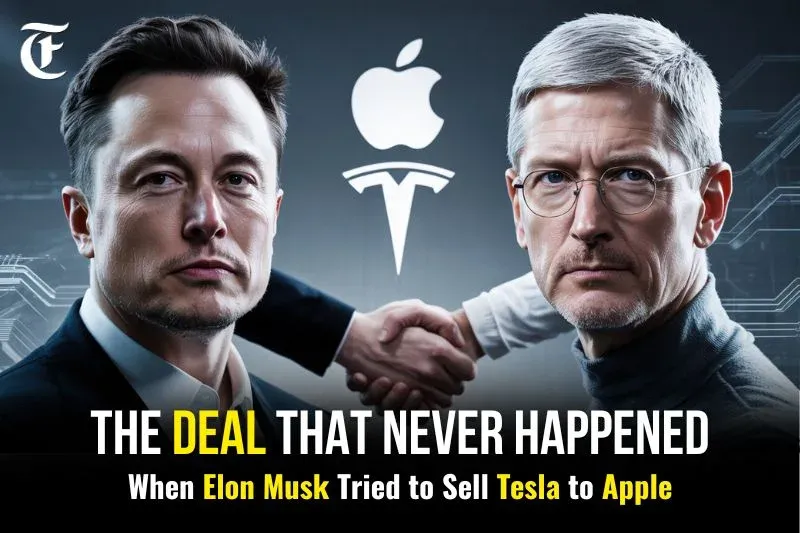When Elon Musk Tried to Sell Tesla to Apple
 |
| A Hidden Chapter in Tesla’s History |
In the world of tech innovation, few names stand taller than Elon Musk. As the face of Tesla, SpaceX, and several other ventures, Musk is seen as a visionary who doesn't give up easily. But there was a time during Tesla’s darkest days when even he considered walking away. What’s even more surprising? He tried to sell Tesla to Apple.
This fact isn’t just a wild rumor. It’s a real moment that nearly reshaped the future of electric vehicles and Silicon Valley as we know it.
Let’s dive into this rarely discussed story that shows how close Tesla came to changing hands and why it didn’t.
The Struggles of Tesla During the Model 3 Crisis
In 2017, Tesla was facing a massive crisis. The launch of the Model 3 a more affordable electric car meant to bring Tesla to the masses turned into a production nightmare. Elon Musk himself later described this period as "production hell."
Tesla was burning cash at a dangerous rate. Delays, quality issues, and supply chain problems pushed the company to the edge. For a time, many believed Tesla wouldn’t survive. The stock dipped. Short-sellers circled. And confidence in the company was shaky at best.
It was during this high-pressure moment that Musk made a surprising move.
Also read: The Shocking Truth Behind Nikola Tesla's 1926 Smartphone Prediction
Musk Reached Out to Tim Cook
As the financial pressure mounted, Elon Musk reached out to Apple CEO Tim Cook. According to Musk, he requested a meeting to discuss the possibility of Apple acquiring Tesla.
The price? One-tenth of Tesla’s current valuation at the time. In hindsight, this sounds shocking but back then, Tesla’s future was far from certain.
Tim Cook, however, reportedly never took the meeting.
In a 2020 tweet, Musk confirmed,
"During the darkest days of the Model 3 program, I reached out to Tim Cook to discuss the possibility of Apple acquiring Tesla... He refused to take the meeting."
This tweet stirred waves across the tech world. Why would Apple pass on an opportunity like that? And what would have happened if the deal had gone through?
Why Did Apple Decline the Offer?
Apple has long been rumored to be working on its own electric vehicle project, often referred to as "Project Titan." While the company has made major strides in software and design, manufacturing a car especially one with Tesla’s complexity would have been a new and risky territory.
Some experts believe Tim Cook wasn’t interested in dealing with Musk’s bold personality and Tesla’s unstable financials at the time. Others think Apple simply wasn’t ready to make such a leap into auto manufacturing.
Regardless of the reason, the decision was made and Apple passed on what could have been the tech acquisition of the decade.
What If Apple Had Bought Tesla?
Imagine a world where Tesla is just a division of Apple. Elon Musk might never have gone on to build what Tesla is today the world’s most valuable car company and a major force in clean energy.
Would the Cybertruck exist? Would Musk have focused more on SpaceX instead? Would Apple have dominated the EV market years ahead of its time?
It’s one of those rare "what if" moments in business history that leaves you wondering just how different things could have been.
Also read: Trump vs Elon Musk Feud Shakes Politics and Tech
From the Brink to the Top
After the failed Apple meeting, Tesla managed to turn things around dramatically. Production ramped up, the Model 3 found its footing, and the company became profitable.
By 2020, Tesla was added to the S&P 500 index. Its stock skyrocketed. And Elon Musk became one of the richest people on Earth.
The same company that almost sold itself for a fraction of its future value is now a global leader in electric vehicles and clean technology.
So, What Does This Teach Us?
The story isn’t just about Musk, Apple, or missed opportunities. It’s a lesson in persistence, timing, and believing in your vision even when others don’t.
Had Elon Musk succeeded in selling Tesla, the world might have never seen the electric revolution we’re living through today. And for Apple, it’s a decision that might always spark debate in tech circles.
Sometimes, the deals that don’t happen end up shaping history even more than the ones that do.
